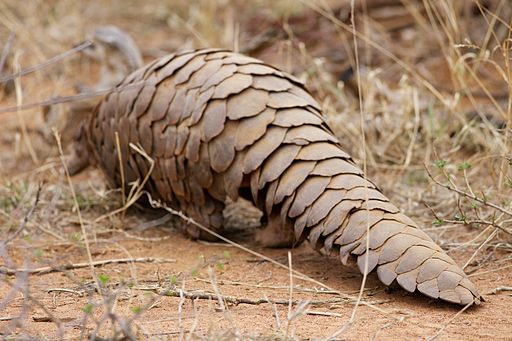Pangolins are strange little creatures, with their diet of ants and termites, and the entire outer surface of their bodies covered with armour-like scales (face, belly & the inner surfaces of the limbs are either hairy or naked). When in danger, pangolins are able to roll up in a ball, presenting only that armoured surface to a predator.
Actually, some of them aren’t so little: from nose tip to tail tip, they range from 75 cm to more than 1.5 m in length, with their strong tails making up about half of that. Arboreal species tend to be smaller, just a couple of kilos in weight, but apparently the giant pangolin can weigh in at over 30kg.
Image by David Brossard (Scaly Anteater exits stage left) [CC BY-SA 2.0 (https://creativecommons.org/licenses/by-sa/2.0)], via Wikimedia Commons
In taxonomic terms pangolins have their own order (Pholidota), with a single family (Manidae) and genus, Manis; there are 4 species in Africa and 4 in Asia. Like giant anteaters they are toothless (edentate), & indeed, they converge with the giant anteaters in a number of ways and for a while the two groups were thought to be closely related. However, it seems that molecular data (from DNA & amino acids) places the pangolins’ order as a sister group to the carnivores. So, the toothless state characteristic of both types of anteater has evolved more than once, as has the heavy musculature and massive claws of their forelimbs.
I hadn’t really thought before about how pangolins manage to digest their diets of termites and ants, after licking them up with those sticky, extrusible tongues. (Here’s something else I didn’t know: a pangolin’s tongue is as long as head & body combined ie half their total body/tail length. It’s folded back into a throat pouch when not in use, and the animals produce so much sticky saliva that they have to drink frequently.) It turns out that the stomach is rather like a bird’s gizzard: its walls are hardened and it contains sand or very small pebbles, which help to grind up those crunchy meals as the muscles in the stomach wall contract and relax.
It seems that yesterday was World Pangolin Day. It would be nice to think that drawing attention to the plight of these strange little creatures would change the fact that they are currently the most trafficked mammal in the world. After all, they range from vulnerable to critically endangered status and are supposedly protected by both national and international legislation. Sadly I think that greed & stupidity will push them over the edge.
Why? Because, as this article in The Independent says, pangolins are poached on a huge scale
for their meat, which is considered a delicacy in China and Vietnam, and their scales, which are used as ingredients in traditional Asian medicine.
Practitioners believe scales are capable of treating a range of ailments including asthma, rheumatism and arthritis.
That defensive habit of rolling up in a ball is useless against poachers, who can just pick the animals up. So, people are prepared to pay a lot of money for the meat and the scales of these creatures, which is where both greed and stupidity come into it.
Greed: well, money talks. In December 2016, Chinese customs made their largest-ever confiscation of scales – a mind-boggling 3.1 tons from an estimated 7,200 pangolins. Their worth: about $US2 million. Research by TRAFFIC, a network that monitors the international wildlife trade, suggests that around 20 tonnes of pangolins, & pangolin parts, are trafficked each year.
And stupidity, because those hugely expensive scales are made of keratin – nothing more and nothing less than the protein that makes up our own hair and nails. People consuming the pangolin’s scales might as well chew their own fingernails, for all the good it would do them. I guess they’ll have to, when the pangolins (and rhinos, whose horns are keratin too) are gone from the world.
